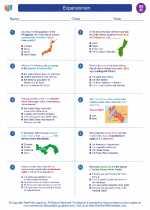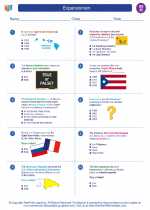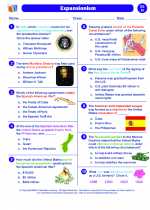Nationalism
Nationalism is a political, social, and economic ideology that emphasizes the interests, culture, and identity of a particular nation or group of people. It is the belief that a nation, defined by its shared history, language, culture, and traditions, should have its own sovereign state and political independence.
Nationalism can manifest in various forms, including cultural nationalism, which focuses on preserving and promoting the cultural heritage of a nation, and political nationalism, which seeks to establish or maintain a separate political identity and autonomy for a nation.
Key elements of nationalism include a sense of national pride, loyalty to one's nation, and the belief in the superiority of one's nation over others. Nationalist movements have played a significant role in shaping world history, particularly in the 19th and 20th centuries, leading to the formation of new nation-states and influencing international relations.
Study Guide: Nationalism
- Define nationalism and explain its key components.
- Discuss the different forms of nationalism and provide examples of each.
- Examine the impact of nationalism on historical events such as the unification of Germany and Italy, and the breakup of the Soviet Union.
- Analyze the role of nationalism in contemporary politics and international relations.
- Discuss the relationship between nationalism and imperialism, and how nationalist movements have challenged colonial rule.
- Explain how nationalism can both unite and divide societies, and its impact on ethnic and cultural conflicts.
- Compare and contrast nationalism with other political ideologies such as liberalism and socialism.
- Explore the role of symbols, rituals, and propaganda in fostering nationalist sentiment.
- Discuss the ethical and moral implications of extreme forms of nationalism, such as ultra-nationalism and xenophobia.
- Examine the effects of globalization on nationalism and the rise of supranational entities like the European Union.
Understanding the complexities of nationalism is crucial for comprehending the dynamics of global politics, identity formation, and conflicts. By critically analyzing its historical and contemporary dimensions, one can gain valuable insights into the power and perils of nationalist ideologies.
[Nationalism] Related Worksheets and Study Guides:
.◂Social Studies Worksheets and Study Guides Eighth Grade. Expansionism

 Worksheet/Answer key
Worksheet/Answer key
 Worksheet/Answer key
Worksheet/Answer key
 Worksheet/Answer key
Worksheet/Answer key
 Worksheet/Answer key
Worksheet/Answer key
